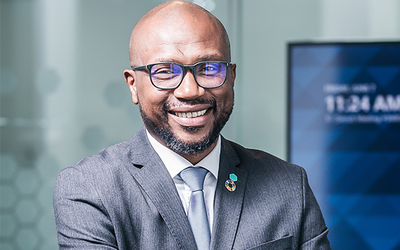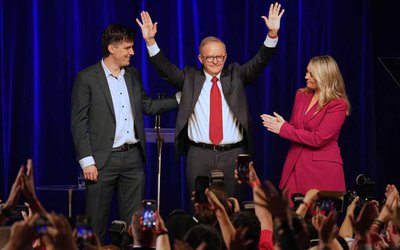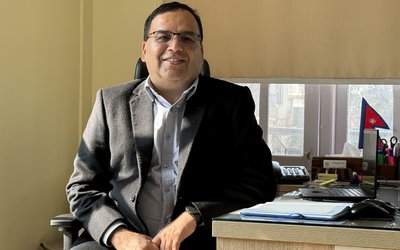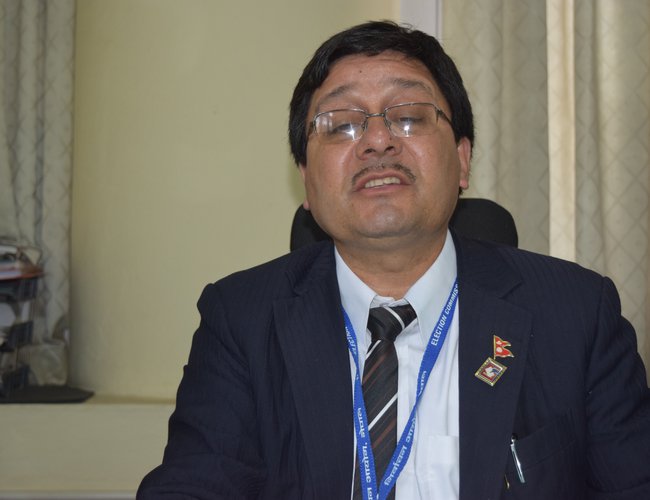
In how many places are you going to hold the elections?
We have already conducted the elections in 34 districts. The second round of elections will be held in 43 districts, including parts of Nawalparasi and Rukum. Elections will be held in 461 units, Municipality and Rural Municipality, covering 4186 wards. The Election Commission has already dispatched the necessary manpower and logistics for the elections. Earlier, we had planned to hold the elections in one round, setting up the office of the chief of Electoral Officer in places, including the units. However, we suspended the local-level units following the postponement of the program. We have already revived all the Electoral Officer's offices at the ward level now. Over 100,000 employees will be deployed for the poll. The offices of the chief election officers and units have already started operations in full phase. We have already trained the chief election officers. Following the training, electoral officers have already moved to their own places of posting to hold the elections. They will establish the election offices in 461 Municipal and Village municipal areas.
What lessons has the Election Commission learnt from the first round of election?
The commission has realized the need to conduct more voter education programs to reduce the number invalid votes. The commission is seriously working to reduce the numbers of invalid votes. Election offices have been established and they are at work from May 29. We are intensively holding voter education programs throughout the areas. There will be well planned security management. EC will work to minimize the security risk in the country. The commission is also discussing with security officials how to improve the security situation in the polling booths. The Election Commission is now working simultaneously to run the polling office, voter education and security programs.
There was a widespread complaint regarding the delay in vote counting. How does the EC look at it?
The EC is well aware of the situation. After the first few days, the pace of counting has tremendously improved. The counting of vote has already completed in the areas where the first round of elections was held. As the ballot paper is large, it takes time to count the vote. In the next round, the counting will be much better because we have learned what is lacking there. There are many candidates and many agents. There are 68 lines in ballot papers and over 400 symbols. There is the need to satisfy the agents of the candidates representing each symbol. There will be more counting places and we will also carry out the orientation program for the political parties. We are requesting the political parties not to raise disputes in counting over petty issues. We will use more manpower. It will take time in counting when there are disputes. We cannot count the vote in a rush because every vote is very important. The EC is analyzing all the shortcomings. We don’t want to create complications by counting in haste.
How do you see the first round of elections?
The EC is really grateful towards the political parties and voters for helping us in holding the elections successfully. Similarly, security agencies and civil servants also worked hard. People were very enthusiastic as exemplified with the turnout of 74-75 percent. It has shown that voters were eagerly waiting to cast vote in the local polls. This election is very significant. For the first time, there will be rural and municipal bodies elected under an inclusive pattern. The election was held for Rural Council and Municipal Council and Rural Executive and Municipal Executive, including judicial body. The participation of marginalized, minorities including Dalits and Women is higher and encouraging. This election was taken as festival. We want to contribute to repeat the first phase of our success. This is a great festival. This is related to legitimacy of the state and legitimacy of service delivery as well. This election has energized us to hold the second round elections more cautiously. This is a great occasion. We want to take voter education to all levels. Every voter should know what the district level bodies do and so on.
What plan do you have for voter education?
As we have conducted several voter education campaigns, we expect that there will be more voters participating in the second round. We want to take voter education in the rural level. Our programs include what is district coordination committee, what is the role and duty of Rural Municipality and Municipality and their functions.
Will it minimize the cancellation of ballot papers?
The current ratio of cancellation of ballot paper was not high. If we are able to continue the current level of momentum with new programs, it is likely we will see a reduction in the cancelation of ballot papers. We can minimize the loss. There will be more voter participation.
How many security forces and employees will be deployed for the second phase?
More than 150,000 security personal and 100,000 employees will be mobilized. Election Commission is limiting its budget not exceeding Rs.10 billion rupees allocated to the commission. If more budget is required, we will request wiith the government for that. As we have been spending money very cautiously, I don’t think we will require a big supplementary budget now. We are spending with a concept of value for money. We have increased the activities but we have spent less budget compared to previous elections. Major expenditure goes to security arrangements and transport and other allowances for employees. EC has fewer budget for other activities. We cannot say how much budget has been spent for security since the security budget is allocated through a different channel. After completion of two phases of elections, we will publicize the budget and expenditure. We will disclose the expenditure which includes foreign aids.
It is reported that EC is barring foreign observer. Can you explain why?
So far as foreign election observers are concerned, they are allowed to monitor only national level elections. Since the last many years, EC has been allowing the national observer. It is the policy of Election Commission and Ministry of Foreign Affairs not to allow foreigners foreign observers to monitor national elections.
What policy do you have for diplomatic missions based in Kathmandu for elections visit?
We have a system for “elections visit” to the development partners including UN bodies and Kathmandu based diplomatic missions. Under the liaison of Ministry of Foreign Affairs, we permitted diplomatic missions for elections visit. Since the second round of elections is going to be held outside Kathmandu, it is very difficult for us to arrange such visits. Since most of our security personnel will be deployed in the elections booth, it will add further burden to provide high security to the representatives of diplomatic missions willing to visit outside the Kathmandu. Ten teams have applied for such election visit permissions through the Ministry of Foreign Affairs. We also provide transport pass. We will follow a similar practice for even the second phase. There is no practice to give observer status to diplomatic missions. We are arranging the elections visit only. Since there are separate Codes of Conduct, criteria and activities for elections observers. They have not even applied for observation.
Have you held meetings with diplomatic missions?
We held discussions with the diplomatic missions. Although they have shown the willingness to pay visits to many parts, we requested them to restrict such visits to a few places due to security reason. It is very difficult to allow diplomats for visiting outside Kathmandu because of security risk. We have not taken any decision yet whether to allow the elections visit to Kathmandu based diplomatic mission. We will take the decision in consultation with Ministry of Foreign Affairs. We still have time.
What about the state of national observer groups?
In the first phase, 66 different local observer groups applied for election monitoring and the commission permitted 49 organizations, which met the criteria for observation. They mobilized 49700 observers in the first phase.
What do you expect from others to hold for free and fair elections in the second round?
We need support and cooperation from political parties. Election Commission is capable to ensure free and fair polls. Our constitutional duty is to hold the elections. We hope all political parties will take part in the second phase of elections. We have compulsions to hold the elections. We will like to request political parties to maintain restraints in the elections. It is unfortunate that there were sporadic incidents of violence in the first phase with some casualty. I would like to request all political parties to maintain restraint on behalf of Election Commission to maintain restrain in second phase. We are expecting political parties to abide by election codes of conduct. Political parties have to take all necessary work to pave the way for voters to exercise their right to vote peacefully. All the media groups and observers too need to follow the code of conduct. In the first phase, there were some reports regarding the misuse of observer status campaigning the candidates of certain political parties.

Gopi Nath Mainali
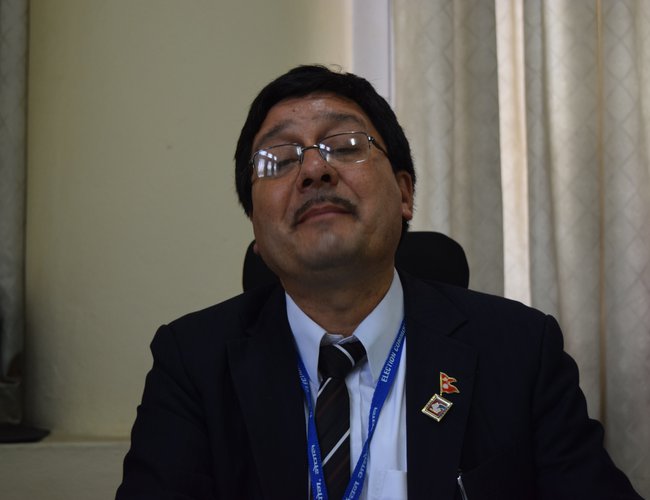

Keshab Poudel
Poudel is the editor of New Spotlight Magazine.
- FOURTH PROFESSOR Y.N. KHANAL LECTURE: Nepal-China Relations
- Jun 23, 2025
- Colonel JP CROSS: Centenary Birthday
- Jun 23, 2025
- REEEP-GREEN: Empowering Communities with MEP
- Jun 16, 2025
- BEEN: Retrofitted For Green
- May 28, 2025
- GGGI has been promoting green growth in Nepal for a decade: Dr. Malle Fofana
- May 21, 2025

